Dulcamara, BittersweetGlycypicron, Amara Dulcis, Solani scandentis |
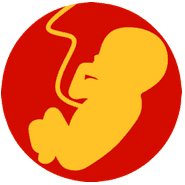
|
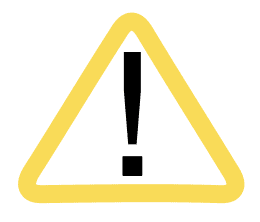
|
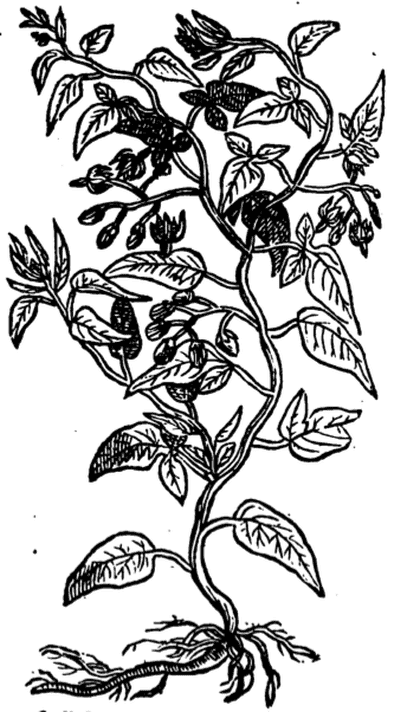
|
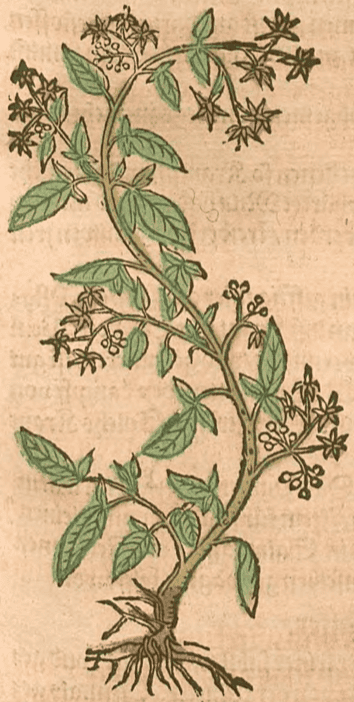
|
|
Parkinson, Theatrum Botanicum, 1640 |
Krauterbuch, Lonitzer, 1578 |
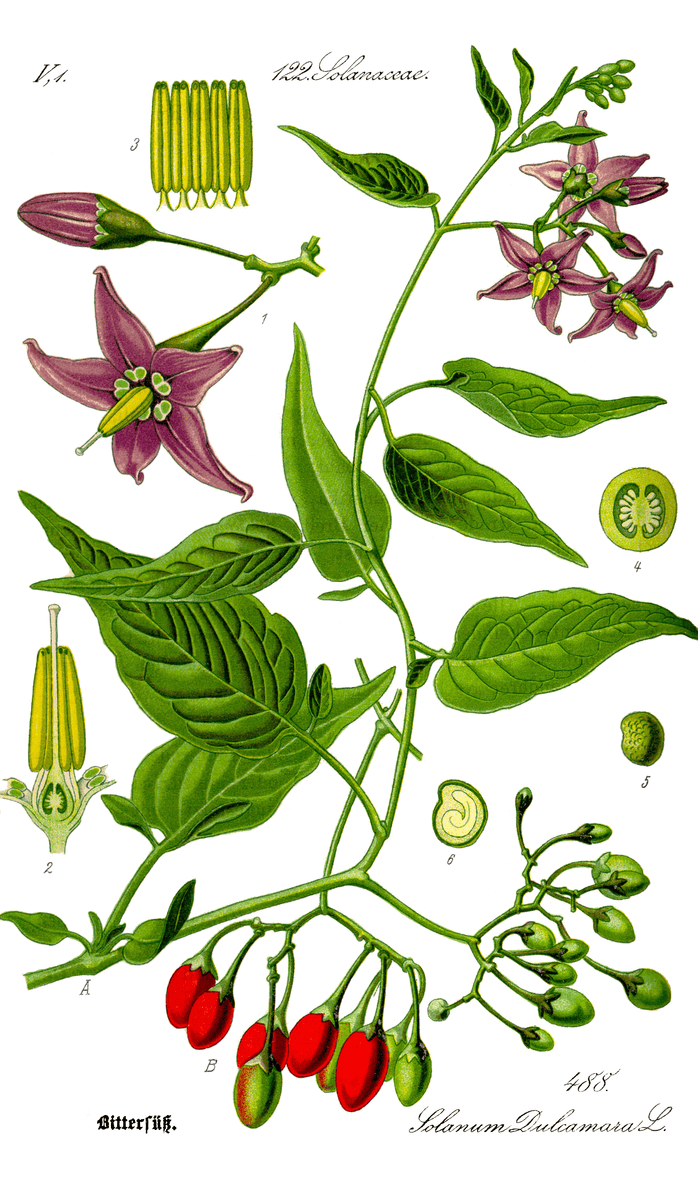 Flora von Deutschland, Österreich und der Schweiz, Otto Wilhelm Thomé, 1885
Flora von Deutschland, Österreich und der Schweiz, Otto Wilhelm Thomé, 1885Botanical name:
Solanum dulcamara
Parts used:
Stem; Whole Plant
Temperature & Taste:
Warm (Cold?), dry. Bitter
cleansing, opening
Classification:
2D ATTENUATERS OF CONGEALED BLOOD
Uses:
1. Clears Liver Heat:
-Yellow Jaundice
-swelling and obstruction of the Liver or Spleen; Hepatitis
-Melancholy, Vertigo, Dizziness
–Eczema (pustular), Psoriasis, Erysipelas, Pityriasis and Syphilitic affections, Leprosy, Ulcers, Bruises, Skin Eruptions, painful Tumors
2. Moves the Blood, clears Stasis:
-obstructed Menstruation, Dysmenorrhea
-Trauma, Bruising, congealed Blood
-has been used for Tumors and Cancers
3. Clears Heat and Damp, Promotes Urine:
-purges by Stool and Urine
-Edema, Ascites
-Rheumatism, Arthritis
4. Clears Heat, Stops Cough:
-chronic Bronchitis, Bronchial Catarrh, Whooping Cough, Asthma, difficulty Breathing
5. Resists Poison:
-Cold, Flu, Catarrh
-Fevers, including Malaria (TCM)
–‘It is good to remove Witchcraft both in men and beast, as all sudden diseases whatsoever’ (Culpeper)
6. Externally:
-It may be used as a wash or ointment topically, as well as being taken internally for these conditions.
-Applied topically to Cancers, especially of the breast.
-Also to Ulcers and Felons; it was common to apply the fresh berries to Felons.
-Also applied to Burns and Scalds
Dose:
Long Infusion or Decoction: 3–9 grams, up to 15 grams
Fluid Extract (1:1): ½–2 fluid drams
Powder: 1–3 grams
Fruit: 1–4 grams, taken in wine.
Substitutes:
1. Sarsaparilla and China root
2. Black Nightshade
3. Solanum lyratum
Main Combinations:
1. Scrofula,:
i. Bittersweet with Figwort
ii. Bittersweet with Burdock root
iii. Bittersweet with Dandelion, Yellow Dock, Sarsaparilla
iv. Bittersweet with Burdock, Fumitory, Cleavers
2. Eczema:
i. Bittersweet with Camomile, Caraway, Senna
ii. Chronic Eczema, Bittersweet with Stavesacre (Bazin)
3. Acute Rheumatism, Syphilis, Bittersweet with Licorice, Burdock root, Sassafras, Guaiacum (Pharmacopoeia extemporanea, Augustin, 1822)
4. To cleanse the Blood (Alterative):
i. Bittersweet with Burdock root, Sarsaparilla, Guaiacum, Licorice (Schönmehl)
ii. Bittersweet with Fumitory, Elm bark, Burdock root, Red Dock root (Formulaire Magistral et Memorial Pharmaceutique, 1823)
5. Hard Tumors of the Breast, Bittersweet with St. Johns wort, Elder bark and Datura as an ointment for topical use
6. Cancer:
i. Bittersweet with Agrimony and Burnet (TCM)
ii. ‘Cancers of the Breast have been cured by the application of the juice to the Cancer, and the green leaves applied to the breast.’ (Madame Young’s Guide to Health, 1858)
7. Gout and Rheumatism, Bittersweet with Birch leaf, Alder Buckthorn (Frangula), Guaiacum (Kroeber)
8. Pulmonary Consumption, Bittersweet with Oxymel of Squill and Syrup of Poppy (Memorial Pharmaceutique, 1824)
9. Ointment for Tumors, Bittersweet with Datura, Hemlock, Belladonna, Yellow Dock, Poke root.
Cautions:
1. Toxic, especially the unripe fruit. (2–3 berries can be toxic to children; overdose of the stem is around 25 grams)
2. Overdose causes nausea, vomiting, dizziness, paralysis. Some people may experience nausea and mild dizziness with normal doses.
3. Best avoided in Pregnancy.
Toxicity:
–Toxicity of nightshade berries (Solanum dulcamara) in mice.
Main Preparations used:
1. Extract of Bittersweet:
i. bruise the stalks of Bittersweet in a mortar, express strongly. Set aside for 2 hours, strain, then evaporate to an extract. (Dispensarium Lippiacum, 1792)
ii. Bittersweet stalks (1 part), Water (8 parts). Macerate 24 hours, then boil for 15 minutes, express strongly. Boil the residue with water (4 parts). Mix the decoctions, set aside for 24 hours, evaporate. (Pharmacopoeia Manualis, Antwerp, 1812)
See History under Solanum nigrum
–Biological activity of alkaloids from Solanum dulcamara L.
–Biological screening of some Turkish medicinal plant extracts for antimicrobial and toxicity activities.
–Beta-solamarine: tumor inhibitor isolated from Solanum dulcamara.
